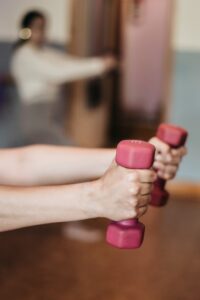Earlier this month, we held a free online Winter Wellbeing Workshop for our patient communities hosted by Health and Wellbeing Coach, Amy Burt from The YOU Trust. The 30 minute workshop outlined key things we can do to look after our physical and mental wellbeing and try to promote a positive mindset over winter months.
For anyone who missed it, here are some key facts from Amy at The YOU Trust:
What is wellbeing?
- Mental
- Physical
- Maintaining a balance
Maintaining a healthy diet

•Make your plate look like a rainbow
•6-8 glasses of water a day
•At least 5 a day
•Be mindful of portions
•Cut down on saturated fat and sugar
Reducing Stress
Most people feel stressed sometimes and certain amounts of stress can be helpful or even motivating. But too much stress can have a significant impact on our health and wellbeing. What can help to reduce stress?
•Identifying the cause
•Talking to someone
Sleep
Lack of sleep can make us feel tired, anxious, irritable, depressed and less able to learn & recall information but it can also affect our physical health.
Top Tips
•Adults need 6– 9 hours sleep each night
•Importance of finding time outside in natural light
•Good sleep environment is important (calm, tidy spaces are proven to aid sleep)
Get your 5 a day……
1) Connect with others
Talking and especially laughing, releases endorphins a natural feel-good chemical that promotes an overall sense of happiness and wellbeing.
2) Be Active
Exercising makes you feel good! As well as your physical health, being active can also have a positive impact on your mental wellbeing.
3) Take Notice
Be aware of the world around you. Being mindful of the present moment both in terms of what is happening in front of you and how you feel can have a positive impact on your mental health.
4) Give to others
This not only creates positive feelings but can also help with your mental wellbeing.
The act of giving doesn’t have to be a physical thing, giving your time can mean so much more.
5) Keep Learning
Learning new skills can give you a sense of achievement and a new confidence.
Regular exercise
NHS guidelines suggest:

– 150 minutes (moderate) activity per week
– Out of breath, talk not sing, raised heart rate
– 2 sessions of strength training
– Physical activity vs Exercise
– Build activity into your day
– Reduce sedentary time (move every 20-30 mins)
Useful Links
www.nhs.uk/live-well/sleep-and-tiredness/why-lack-of-sleep-is-bad-for-your-health
10 tips to beat insomnia – NHS (www.nhs.uk)
10 stress busters – NHS (www.nhs.uk)
Stress – Every Mind Matters – NHS (www.nhs.uk)

